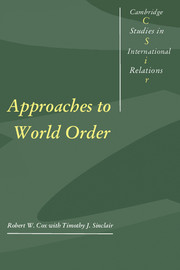Book contents
- Frontmatter
- Contents
- Preface
- Acknowledgements
- Part I Overviews
- Part II Theory
- Part III Interpretations
- Part IV Multilateralism
- 16 The executive head: an essay on leadership in international organization (1969)
- 17 Decision making (with Harold K. Jacobson) (1977)
- 18 Ideologies and the New International Economic Order: reflections on some recent literature (1979)
- 19 Labor and hegemony (1977)
- 20 Labor and hegemony: a reply (1980)
- 21 Multilateralism and world order (1992)
- 22 Globalization, multilateralism, and democracy (1992)
- Complete bibliography of works by Robert W. Cox to 1995
- Index of names
- Index of subjects
- CAMBRIDGE STUDIES IN INTERNATIONAL RELATIONS
20 - Labor and hegemony: a reply (1980)
Published online by Cambridge University Press: 05 June 2012
- Frontmatter
- Contents
- Preface
- Acknowledgements
- Part I Overviews
- Part II Theory
- Part III Interpretations
- Part IV Multilateralism
- 16 The executive head: an essay on leadership in international organization (1969)
- 17 Decision making (with Harold K. Jacobson) (1977)
- 18 Ideologies and the New International Economic Order: reflections on some recent literature (1979)
- 19 Labor and hegemony (1977)
- 20 Labor and hegemony: a reply (1980)
- 21 Multilateralism and world order (1992)
- 22 Globalization, multilateralism, and democracy (1992)
- Complete bibliography of works by Robert W. Cox to 1995
- Index of names
- Index of subjects
- CAMBRIDGE STUDIES IN INTERNATIONAL RELATIONS
Summary
When I wrote “Labor and Hegemony,” I anticipated two kinds of critical reaction: one on the ground that the method and approach was at variance with mainstream political science; the other in defense of two institutional establishments whose ideological foundations were challenged in the article, the ILO and the AFL-CIO. Both these organizational establishments place great stock in the idea of tripartism, representing it as a form of pluralism or a bargaining relationship of independent actors – unions, employers, and government. In “Labor and Hegemony,” I argued that this appearance of independence has to be understood as the ideological expression of a particular structure of social power, a particular form of hegemony that is found in advanced capitalist societies with the emergence of a corporative form of state. This blocco storico is the proper object of study, and since it has international as well as national dimensions its study can be a fruitful approach to international affairs and international organization.
A response from ILO quarters came in the form of a letter signed by a retired ILO official. It did not really require substantive comment from me since it did not deal with the basic questions I had raised. The letter purported to find inaccuracies in my account, though it merely presented some additional facts that were either irrelevant to or would have supported my argument had they been put into a fuller context.
- Type
- Chapter
- Information
- Approaches to World Order , pp. 471 - 493Publisher: Cambridge University PressPrint publication year: 1996
- 1
- Cited by



